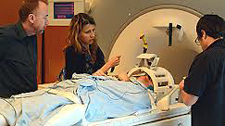redo Jump to...
print Print...
 (from ITV News) – A Canadian crash victim, who was thought to have been in a vegetative state for more than a decade, has told scientists through the power of thought that he is not in pain.
(from ITV News) – A Canadian crash victim, who was thought to have been in a vegetative state for more than a decade, has told scientists through the power of thought that he is not in pain.
Scott Routley proved he is conscious and aware of his surroundings after he communicated with researchers through a brain scan.
It is the first time a severely brain damaged patient has been able to provide clinically relevant information to doctors.
British neuroscientist Professor Adrian Owen, who leads the research team at the Brain and Mind Institute of Western Ontario, told a BBC Panorama program:
Scott has been able to show he has a conscious, thinking mind. We have scanned him several times and his pattern of brain activity shows he is clearly choosing to answer our questions. We believe he knows who and where he is.
Asking a patient something important to them has been our aim for many years.
In future we could ask what we could do to improve their quality of life. It could be simple things like the entertainment we provide, or the times of day they are washed and fed.
Mr. Routley, from Ontario, suffered traumatic brain injuries when his car collided with a police vehicle – for more than 12 years, he was assumed to have been in a vegetative state.
[Previous to Mr. Routley’s communication with Professor Owen, it was believed that] vegetative state patients were not aware of their surroundings or capable of conscious thought.Neurologist Professor Bryan Young, from University Hospital in London, Ontario, who has cared for Mr. Routley for 10 years said the findings overturned previous assessments of the crash victim’s condition.
He had the clinical picture of a typical vegetative patient – no emotional response, no fixation or following with his eyes.
He didn’t have any spontaneous movements that looked meaningful and I was quite impressed and amazed that he was able to show these cognitive responses with fMRI. [Functional Magnetic Resonance Imaging (fMRI) measures the real-time activity of the brain by tracking the flow of oxygen-rich blood.]
– Neurologist Professor Bryan Young
Another of Prof Owen’s patients – road accident victim Steven Graham – was asked whether he knew about his two-year-old niece Ceili.
Mr. Graham answered “yes” to the question which showed he was able to create and store memories as she was born after his accident.
Prof Owen has previously shown that nearly one in five vegetative patients may in fact be conscious.
ITV is a major commercial public service TV network in the United Kingdom. Launched in 1955 to provide competition to the BBC, it is also the oldest commercial network in the United Kingdom. Reprinted here for educational purposes only. May not be reproduced on other websites without permission from ITV. Visit the website at itv.com.
Questions
1. a) What is a “vegetative state”?
b) Define neuroscientist and neurologist.
2. a) How long has Scott Routley been in a vegetative state?
b) How did he prove he is conscious and aware of his surroundings?
3. Why does Professor Owen’s research team believe Scott Routley, though in a vegetative state, has a conscious, thinking mind?
4. How could scientists use this type of communication to help these patients in the future?
5. Why was neurologist Bryan Young, who has cared for Mr. Routley for 10 years, amazed by his responses using fMRI?
6. Prof Owen has previously shown that nearly one in five vegetative patients may in fact be conscious. With continued study, will that number increase?
Background
NOTE: Functional Magnetic Resonance Imaging (fMRI) measures the real-time activity of the brain by tracking the flow of oxygen-rich blood.
More on Prof. Owen’s method of communication:
- Professor Owen, a British neuroscientist developed a technique for reading the minds of people who were in a vegetative state almost three years ago.
- Using an advanced MRI brain scanner he and his team from Cambridge University were able to show that the patients were thinking, and could interact with them obtaining “yes” and “no” answers to questions, even though it was impossible to establish communication at the bedside.
- The findings were hailed by experts, who said they would have “a profound impact across medicine.”
- Professor Owen moved to Canada later in 2010 to pursue his research at the Brain and Mind Institute, Western Ontario where he investigated the case of Scott Routley, from London, Ontario, who was believed to have been in a vegetative state for 12 years following a traumatic collision with a police car at a cross roads.
- Even though his parents had always thought Scott was conscious and could communicate by lifting his thumb or moving his eyes, this was never accepted by medical staff.
- Using the technique he developed in Cambridge, Professor Owen tested whether Routley had any awareness by giving him instructions and monitoring his brain activity on the brain scanner.
- The technique involved asking Routley questions and getting him to imagine one of two scenarios depending on whether the answer was yes or no.
- The two scenarios were playing a game of tennis and walking through his home.
- They triggered patterns of activity in different parts of the brain which were mapped by the scanner, allowing the scientists to communicate with him. (from a yahoonews report)
Daily “Answers” emails are provided for Daily News Articles, Tuesday’s World Events and Friday’s News Quiz.



